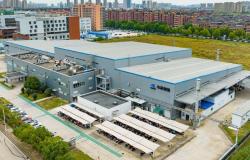The theme of the energy transition and the solutions to best interpret it has long invested the research of 2G Energy AG, one of the world’s largest producers of cogeneration systems which is preparing to celebrate its 30th anniversary in 2025. This is demonstrated by his latest applied research project which involved theUniversity of Amberg-Weiden in Germany in the transformation of an existing cogeneration plant fromgas to hydrogen power supply. Faced with a significant number of existing decentralized gas-powered plants – from industry to municipal service companies – the demonstration that the conversion to hydrogen is not only possible but also manageable quickly and cost-effectively is crucial for the realization of the energy transition and for the achievement of the highest objectives in terms of emissions. These are precisely the reasons that pushed 2G, together with the Ostbayerische Technische Hochschule Amberg-Weiden (OTH Amberg-Weiden) to reach this goal.
The plant involved in the conversion project is a natural gas cogenerator pre-existing with one electrical capacity of 250 kWinstalled at the OTH Amberg in March 2019 and already used in research and teaching since its commissioning.
Christian Manca, CEO of 2G Italia
Our propensity for sustainability in terms of autonomous and efficient energy production has roots even further back, when 2G invested its energies in biogas-fueled cogeneration in the agricultural sector, transforming waste into opportunity. The vocation to experiment and the subsequent combination with international technical-scientific research in the experimentation of other types of gas have allowed 2G to achieve a leading role in the hydrogen cogeneration sector.The happy outcome of the conversion of the Amberg-Weiden plant represents the natural evolution of this path as well as a reason for pride in being part of a large group that sees change as a possibility, in the union of very high level skills a point of strength and in offering solutions that can be implemented immediately, an advantage for the entire community. For us, this was the profound meaning of the ambitious project created with the OTH. The hydrogen era is upon us. In fact, if by transition we mean a moment of passage, the timing of the conversion of the numerous existing plants becomes crucial in the process of approaching the Net Zero objective. Strengthened by the Group’s know-how and supported by the many certainties that emerged from the recently concluded project, 2G Italia is ready to involve the Italian production fabric in the same process by offering reliable, efficient, safe and naturally even more sustainable solutions.
2G’s commitment to the production of electrical and thermal energy on site using hydrogen dates back to 2014. One of the first 100% hydrogen cogeneration plants was built as part of a collaborative project between Stadwerk Hassfurt GmBH and the Institute of Energy Technology itself at the OTH in Amber-Weiden. The search continued with the next one “CH2P Project”, a technical-scientific research initiative funded by the Federal Ministry for Economic Affairs and Climate Protection with the aim of increasing the power density of hydrogen generators. This know-how, acquired in the installation of new systems, it was certainly decisive in facilitating the conversion process of the gas cogeneration plant in Amberg-Weiden.
A modular design
The success of the project just concluded, in fact, also has deep roots in the design: for several years all 2G cogeneration plants feature a modular design which, thanks to the results of continuous research and installations, has been increasingly optimized based on the new fuel, facilitating the conversion by replacing individual elements.
This is the case of the adaptation of geometry of the combustion chamber. In addition to the change in the compression ratio caused by the use of different pistons, this was necessary during the conversion also modify the mixture formation process which, with hydrogen, needs to take place directly in the combustion chamber. For this purpose, hydrogen is introduced into the intake pipe via a gas injector before the ignition-ready mixture is fed into the combustion chamber. In addition to being easier to ignite than conventional gases, hydrogen also has a higher laminar flame speed, which requires compressed air to be mixed with hydrogen only shortly before combustion to avoid uncontrolled ignition.
Another important and determining aspect is that of the need to immediately connect maintenance and retrofit programs to hydrogen conversion plans. Both pistons and 2G gas injectors, as well as the hydrogen-capable turbo compressor, they have long been standardized to the point that they can be replaced or updated – as normally happens during regular inspections – at a later stage with a conversion cost that can be reduced to 10-15% of the initial investment.
Frank Grewe, CTO of 2G Energy AG
At the moment, we have introduced hydrogen engines with an average pressure of up to 14 bar, compared to 18 bar in the natural gas series, which leads to a slight reduction in output. At Heek we are also testing hydrogen at 18 bar, guaranteeing identical performance. Colleagues in Amberg have the same resources to perform advanced searches.
The other side concerns the dedicated storage facilitywhose construction work on the hydrogen supply station for the pilot cogenerator in Amberg will see completion in the near future, demonstrating 2G’s ongoing commitment as a facilitator of energy autonomy processes in the direction of sustainability.
As further testimony to 2G’s commitment to scientific research on hydrogen and for a sustainable energy transition, the German company has just hosted the associates of the “HydrogenJRP” project and the professors of the Polytechnic University of Milan at the Stadtwerk Haßfurt plantwhere the innovative 2G hydrogen cogenerator was presented.





